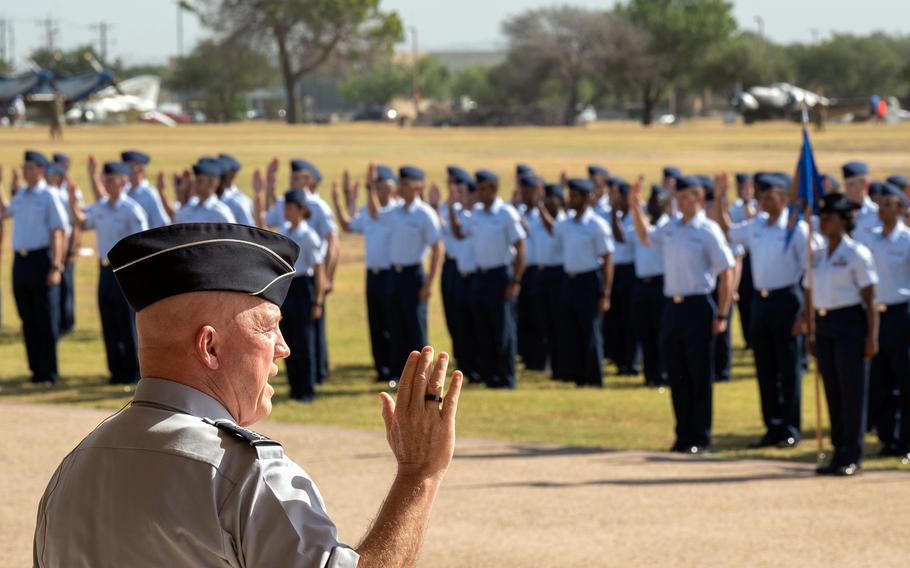
Air Force Gen. John “Jay” Raymond gives the oath of enlistment to basic training graduates at Joint Base San Antonio-Lackland, Texas, on June 23, 2022. (Ethan Johnson/U.S. Space Force)
The oath of enlistment for the United States armed forces has long included a promise to support and defend the U.S. Constitution. It is a job our military members have performed bravely and nobly since the earliest days of our nation.
But it is increasingly clear all Americans have a role to play in supporting our Constitution and its principles. This work is especially important if we want future generations of citizens to value the rights and liberties our country holds dear.
December 15 is Bill of Rights Day, marking 232 years since the first 10 amendments to the Constitution were ratified.
The Bill of Rights codifies rights all people should enjoy, such as freedom of speech and religion, due process, and protections against government overreach. But an appreciation of these rights is not passed to our children in their DNA. It must be taught and internalized — and we have much work to do on that front.
Research shows many young people feel increasingly disconnected from the core founding principles that long served as a source of unity for our country.
• A 2022 study by the nonprofit Knight Foundation found 30% of students believe the First Amendment “goes too far.” Only 57% said news organizations should be able to publish without government censorship — hardly a reassuring majority.
• According to a Pew Research Center report published last year, 62% of teens believe feeling welcome and safe online is more important than being able to speak our minds freely.
• Pew researchers also found America’s age 18-29 demographic now has a more positive view of socialism than capitalism.
While these statistics are alarming, we cannot blame our young people. We all have a shared responsibility, through our schools and at individual levels, to help our children understand the importance of America’s founding and constitutional principles.
This is where civics education can play a powerful role.
At the Bill of Rights Institute, we work with 73,000 civics and history teachers who reach more than 7 million students per year. We see firsthand the effect education can have in helping students understand their rights and responsibilities as citizens, and why those rights and responsibilities exist.
Oregon student Caroline Gao was the 2023 winner of our MyImpact Challenge contest, where students learn about citizenship and founding principles, such as liberty and equality. Students then develop service projects connected to these principles. Caroline, who arranged a cultural exchange program in her community, said that the MyImpact Challenge program helped her understand “just how much founding principles and civic virtues in the U.S. are ingrained in my own values and beliefs.”
Teaching our values and principles works. In fact, Knight Foundation researchers discovered that students who took classes with First Amendment content became more supportive of free speech rights. This has held true in every survey the organization conducted since 2004.
These types of results are possible when we prioritize civic learning and make an effort to connect our children to America’s founding principles.
I believe members of the United States military and veterans can play helpful roles in our children’s civic education.
We were grateful to have Medal of Honor recipient Florent Groberg join us for a Constitution Day program in September. He immigrated to the United States when he was just 11 years old and felt compelled to serve his adopted country.
Groberg enlisted in the U.S. Army in 2008 and was wounded in Afghanistan in 2012 while protecting troops from a suicide bomber. To this day, Groberg considers taking his oath of enlistment, where he swore to support and defend the Constitution, as one of the proudest moments of his life.
Our military members and veterans have all taken that oath, and their families sacrificed in service to it, too.
Talk to your children, their friends, and young family members about why your oath, and protecting our principles and rights as Americans, matter to you. Look for opportunities to speak at schools or to youth groups. Your story can make a difference.
George Washington once wrote that, “Liberty, when it begins to take root, is a plant of rapid growth.” We all have a role to play in helping liberty and freedom take root among our children.
David J. Bobb is president and CEO of the Bill of Rights Institute, a nonprofit, nonpartisan organization that works to advance civics and history education.